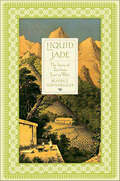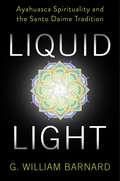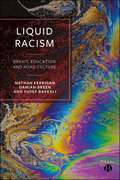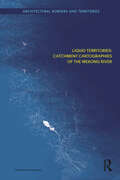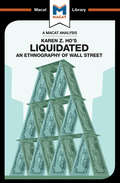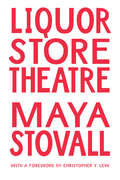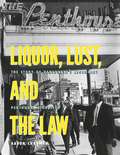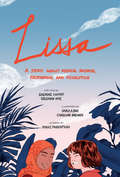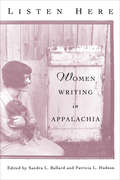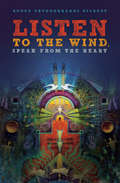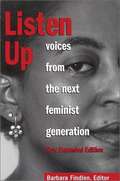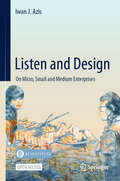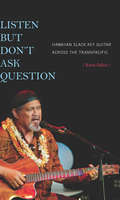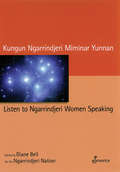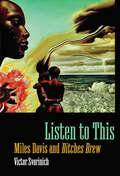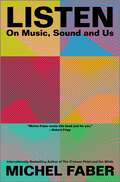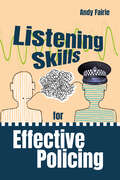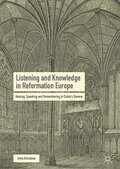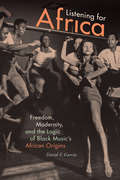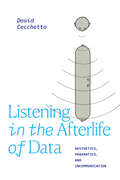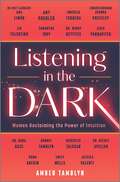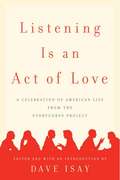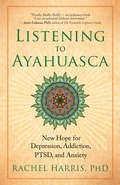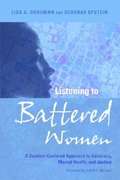- Table View
- List View
Liquid Jade: The Story of Tea from East to West
by Beatrice HoheneggerTraveling from East to West over thousands of years, tea has played a variety of roles on the world scene – in medicine, politics, the arts, culture, and religion. Behind this most serene of beverages, idolized by poets and revered in spiritual practices, lie stories of treachery, violence, smuggling, drug trade, international espionage, slavery, and revolution. Liquid Jade's rich narrative history explores tea in all its social and cultural aspects. Entertaining yet informative and extensively researched, Liquid Jade tells the story of western greed and eastern bliss. China first used tea as a remedy. Taoists celebrated tea as the elixir of immortality. Buddhist Japan developed a whole body of practices around tea as a spiritual path. Then came the traumatic encounter of the refined Eastern cultures with the first Western merchants, the trade wars, the emergence of the ubiquitous English East India Company. Scottish spies crisscrossed China to steal the secrets of tea production. An army of smugglers made fortunes with tea deliveries in the dead of night. In the name of "free trade" the English imported opium to China in exchange for tea. The exploding tea industry in the eighteenth century reinforced the practice of slavery in the sugar plantations. And one of the reasons why tea became popular in the first place is that it helped sober up the English, who were virtually drowning in alcohol. During the nineteenth century, the massive consumption of tea in England also led to the development of the large tea plantation system in colonial India – a story of success for British Empire tea and of untold misery for generations of tea workers.Liquid Jade also depicts tea's beauty and delights, not only with myths about the beginnings of tea or the lovers' legend in the familiar blue-and-white porcelain willow pattern, but also with a rich and varied selection of works of art and historical photographs, which form a rare and comprehensive visual tea record. The book includes engaging and lesser-known topics, including the exclusion of women from seventeenth-century tea houses or the importance of water for tea, and answers such questions as: "What does a tea taster do?" "How much caffeine is there in tea?" "What is fair trade tea?" and "What is the difference between black, red, yellow, green, or white tea?" Connecting past and present and spanning five thousand years, Beatrice Hohenegger's captivating and multilayered account of tea will enhance the experience of a steaming "cuppa" for tea lovers the world over.
Liquid Light: Ayahuasca Spirituality and the Santo Daime Tradition
by G. William BarnardThe Santo Daime is a syncretic religion that arose in the Amazon region of Brazil in the middle of the twentieth century and now has churches throughout the world. Its spiritual practice is based around the sacramental use of ayahuasca, a psychedelic brew consumed only within regular ceremonies. In Liquid Light, G. William Barnard—an initiate of the religion and a scholar of religious studies—considers the religious practice and transformative inner experiences of the Santo Daime community.Immersing readers in his own journeys into nonordinary states of consciousness, Barnard provides a vivid as well as introspective depiction of the dramatic ritual and visionary worlds that a practitioner of this tradition encounters. He combines striking first-person accounts of the ritual life of the Santo Daime with accessible examinations of the psychological and philosophical significance of mystical states and mediumship. Bridging insider and outsider perspectives on religious experience, Barnard demonstrates how the Santo Daime offers its practitioners a transformative and profoundly illuminating spiritual path. Liquid Light also reflects on the broader implications of psychedelics, arguing that entheogenic religions can shed light on a wide range of key philosophical questions concerning consciousness, selfhood, and reality.
Liquid Racism: Brexit, Education and Road Culture
by Damian Breen Nathan Kerrigan Yusef BakkaliBauman argues that our lives are ruled by ambivalence. In this ambiguous world, liquified social structures can create an anxiety towards the ‘other.’ This innovative book takes Bauman’s notions of ‘liquid modernity’ one step further to develop a theory of ‘liquid racism’. The authors show that while post-race theory argues that society is moving beyond racism, in reality, historical manifestations of racism continue. Except, society is now faced with a racism whose structures have changed. Examining Brexit, education and black youth culture as case studies to reveal the application of liquid racism, this book makes a major contribution to our understanding of the (un)changing nature of racism.
Liquid Territories: Catchment Cartographies of the Mekong River (Architectural Borders and Territories)
by Christoforos RomanosIn addition to being a fundamental concept for planning the water infrastructure which supports extensive agricultural economies across Southeast Asia, knowledge of the Mekong River’s hydrological catchments has calibrated the control of land, resources and people. Liquid Territories shows how and why the areal dimensions of the Mekong’s basin, delta and floodplain have become a critical geographic reference for human activities.This book concentrates on the way knowledge of the river’s catchments has been recorded on, and extracted from, maps. Repeatedly drawn by geographers, engineers and cartographers since before the start of European colonization, the book describes how cartographic projections of the basin, delta and floodplain have affected geopolitical strategy, the exercise of military power and anthropogenic modifications of the terrain. Drawing on the discourses of hydrology, geography and cartography, as well as military science, colonial politics and regional planning, the book explains why the spatial articulation of surface water flows is reflected in the configuration of national boundaries, soils and settlements today. Focusing on geographic concepts, the book provides insights into the process of urbanization in Southeast Asia, the region’s colonial and post-colonial history, the Mekong River’s political ecology, the scales of contemporary water management and the design of territory.This book will be relevant to academics who are interested specifically in the Mekong River and Lower Mekong Basin as well as in integrated water management planning. It would be especially relevant to architects, urbanists and landscape architects.
Liquidate: How Money is Dissolving the World
by Alf HornborgLiquidate: How Money is Dissolving the World examines the emergence of money and its social and ecological repercussions. It views money as a new phenomenon in the evolution of life that has fundamentally transformed ecosystems and human social relations.The appearance of coined money around 600 BCE coincided with the first abstract philosophies and religions. This book shows how changes in human–environmental relations have reflected changes in social relations generated by money. The detached modern view of nature mirrors the socially detached modern individual. However, the abandonment of animism has not diminished the human propensity for fetishism – the perception of artefacts such as money tokens as indexes of what they represent. Market prices obscure the asymmetric global resource transfers that make increasingly advanced technologies possible where there is enough money. Our fetishised understandings of money and technologies cannot deal with the escalating production of entropy underlying climate change. They also drive the dramatic reduction of biological and cultural diversity under globalisation. Given these problems, many people reassess premodern and indigenous societies in search of more sustainable ideas on how to organise exchange.Liquidate: How Money is Dissolving the World will be of interest to scholars working in anthropology, sociology, economics, history, semiotics, comparative religions, and indigenous studies.
Liquidated: An Ethnography of Wall Street
by Rodolfo MaggioLiquidated is a work of anthropology that treats an unusual, despised subculture – that of the Wall Street banker – much as anthropologists have traditionally treated remote ‘savage’ tribes. But using the techniques of ethnography, including interviews, analysis of daily lives, and fieldwork to investigate a modern western culture is not original; what sets Ho's work apart and gives it value is her mastery of the critical thinking skills of problem-solving and creative thinking to reconceptualize the way in which we understand the bankers' mindset. Ho's great achievement is to ask productive questions, most obviously in drawing a distinction between bankers' self-image as capitalist warriors, freeing up value for themselves and shareholders by increasing the liquidity of the assets they invest in, and the social consequences of what they do. As Ho points out, not only is Wall Street institutionally inclined to embrace risk, in order to maximise profit; it is also prone to assume that increased liquidity (most often achieved by breaking up and selling off the parts of a large corporation) is a good in itself, irrespective of the outcomes for the workers actually involved in these disposals. Considering alternative possibilities, and generating fresh solutions, Ho determines that the capitalist principles that underpin Wall Street are myths, not the expression of some natural economic law..
Liquor Store Theatre (Black Outdoors: Innovations in the Poetics of Study)
by Maya StovallFor six years Maya Stovall staged Liquor Store Theatre, a conceptual art and anthropology video project---included in the Whitney Biennial in 2017---in which she danced near the liquor stores in her Detroit neighborhood as a way to start conversations with her neighbors. In this book of the same name, Stovall uses the project as a point of departure for understanding everyday life in Detroit and the possibilities for ethnographic research, art, and knowledge creation. Her conversations with her neighbors—which touch on everything from economics, aesthetics, and sex to the political and economic racism that undergirds Detroit's history—bring to light rarely acknowledged experiences of longtime Detroiters. In these exchanges, Stovall enacts an innovative form of ethnographic engagement that offers new modes of integrating the social sciences with the arts in ways that exceed what either approach can achieve alone.
Liquor, Lust and the Law
by Aaron ChapmanThe story of Vancouver's legendary Penthouse nightclub, founded in 1947 and active to this day. In its heyday, acts like Sammy Davis Jr and Nat King Cole performed, and stars like Frank Sinatra and Gary Cooper visited; in the 1970s, the club became infamous for its exotic dancers and a lurid history that included vice squads, politicians, and con men.
Lissa: A Story About Medical Promise, Friendship, And Revolution
by Sherine Hamdy Coleman Nye Sarula Bao Caroline BrewerAs young girls in Cairo, Anna and Layla strike up an unlikely friendship that crosses class, cultural, and religious divides. Years later, Anna learns that she may carry the hereditary cancer gene responsible for her mother's death. Meanwhile, Layla's family is faced with a difficult decision about kidney transplantation. Their friendship is put to the test when these medical crises reveal stark differences in their perspectives...until revolutionary unrest in Egypt changes their lives forever.The first book in a new series, Lissa brings anthropological research to life in comic form, combining scholarly insights and accessible, visually-rich storytelling to foster greater understanding of global politics, inequalities, and solidarity.
Listen Here: Women Writing in Appalachia
by Sandra L. Ballard and Patricia L. Hudson&“A comprehensive and unsurpassed anthology of women writers from Appalachia . . . Exceptional in diversity and scope.&” —Southern Historian Listen Here: Women Writing in Appalachia is a landmark anthology that brings together the work of 105 Appalachian women writers, including Dorothy Allison, Harriette Simpson Arnow, Annie Dillard, Nikki Giovanni, Denise Giardina, Barbara Kingsolver, Jayne Anne Phillips, Janice Holt Giles, George Ella Lyon, Sharyn McCrumb, and Lee Smith. Editors Sandra L. Ballard and Patricia L. Hudson offer a diverse sampling of time periods and genres, established authors and emerging voices. From regional favorites to national bestsellers, this unprecedented gathering of Appalachian voices displays the remarkable talent of the region&’s women writers who&’ve made their mark at home and across the globe. &“A giant step forward in Appalachian studies for both students and scholars of the region and the general reader . . . Nothing less than a groundbreaking and landmark addition to the national treasury of American literature.&” —Bloomsbury Review &“A remarkable accomplishment, bringing together the work of 105 female Appalachian writers saying what they want to, and saying it in impressive bodies of literature.&” —Lexington Herald-Leader &“One of the keenest pleasures in Listen Here lies in its diversity of voices and genres.&” —Material Culture &“Besides introducing readers to many new voices, the anthology provides a strong counterpart to the stereotype of hillbillies that have cursed the region.&” —Atlanta Journal-Constitution &“Full of welcome surprises to those new to this regional literature: specifically, it includes particularly strong selections from children&’s fiction and a substantial number of African American writers.&” —Choice
Listen To The Wind, Speak From The Heart
by Roger Thunderhands GilbertImagine sitting around a campfire listening to a wise elder speak wisdom so deep that each short tale could be life changing. Listen to the Wind, Speak from the Heart, tells these kind of stories. Roger Thunderhands Gilbert writes from the heart, passing on the wisdom of his Spirit self in plain, understandable, and passionate language. Thunderhands's integration of Native American, Taoist, and many other wisdom traditions blend seamlessly, illuminating everything from Earth changes, Hopi and Mayan prophecies, ancient star ancestors, global political climate and protests, technology, food and water crisis and other issues. Thunderhands's stories are full of light and hope, teaching of love and life, and of the responsibility to the self, the planet, and all people. Combining shamanistic and Eastern knowledge, healing techniques, and practices, this book delivers an important synthesis of insights for today's global culture.Winner 2013 COVR award - Gold
Listen Up: Voices From the Next Feminist Generation
by Barbara FindlenA collection of essays explore such topics as feminist politics, sex, racism, careers, identity, and abortion.
Listen and Design: On Micro, Small and Medium Enterprises
by Iwan J. AzisThis open access book thoroughly investigates the domain of policy design tailored specifically for micro, small, and medium enterprises (MSMEs) with a central emphasis on harmonizing these policies with the preexisting social capital inherent to these enterprises, consistent with the mandate of Bank Indonesia to guard price stability and to promote financial stability, inclusive, and sustainable growth. The study, grounded in the context of Indonesia, underscores the paramount importance of a systematic approach, necessitating social planners and stakeholders to engage in a preliminary phase of active listening, empathetic understanding, and comprehensive knowledge of the diverse mental frameworks prevalent among MSMEs across the nation before embarking on the formulation of bespoke interventions. Readers of this scholarly work can anticipate gaining insightful perspectives into the nuanced policy preferences of both MSMEs and government officials. The methodologies employed, including the Analytic Hierarchy Process and Analytic Network Process, are not only presented but also subjected to rigorous feasibility assessments using the Mechanism Design Theory. Furthermore, the book delves into the intricate challenges faced by MSMEs, including addressing the financing gap and adapting to the digitalization landscape that considers the prevailing social capital, both of which significantly influence their overall productivity. Ultimately, the study underscores the pivotal role played by networks, rather than mere size and the usual suspects (financing, technology, and management), as the linchpin of social capital that profoundly shapes the performance of MSMEs within a specific socio-economic context.
Listen but Don't Ask Question: Hawaiian Slack Key Guitar across the TransPacific
by Kevin FellezsPerformed on an acoustic steel-string guitar with open tunings and a finger-picking technique, Hawaiian slack key guitar music emerged in the mid-nineteenth century. Though performed on a non-Hawaiian instrument, it is widely considered to be an authentic Hawaiian tradition grounded in Hawaiian aesthetics and cultural values. In Listen But Don&’t Ask Question Kevin Fellezs listens to Kanaka Maoli (Native Hawaiian) and non-Hawaiian slack key guitarists in Hawai&‘i, California, and Japan, attentive to the ways in which notions of Kanaka Maoli belonging and authenticity are negotiated and articulated in all three locations. In Hawai&‘i, slack key guitar functions as a sign of Kanaka Maoli cultural renewal, resilience, and resistance in the face of appropriation and occupation, while in Japan it nurtures a merged Japanese-Hawaiian artistic and cultural sensibility. For diasporic Hawaiians in California, it provides a way to claim Hawaiian identity. By demonstrating how slack key guitar is a site for the articulation of Hawaiian values, Fellezs illuminates how slack key guitarists are reconfiguring notions of Hawaiian belonging, aesthetics, and politics throughout the transPacific.
Listen to Ngarrindjeri Women Speaking: Kungun Ngarrindjeri Miminar Yunnan
by Diane BellThe Ngarridjeri women of South Australia reveal their thoughts, daily challenges, and visions for the future in this moving book. The stories range from charming and delightful to jarring and shocking, and delve into matters both social and personal--including the Hindmarsh Island bridge controversy. Serving as a model for how indigenous and nonindigenous women can jointly write a book, this narrative can help indigenous women in other communities develop their own collective history and visions for the future.
Listen to This: Miles Davis and Bitches Brew (American Made Music Series)
by Victor SvorinichListen to This stands out as the first book exclusively dedicated to Davis's watershed 1969 album, Bitches Brew. Victor Svorinich traces its incarnations and inspirations for ten-plus years before its release. The album arrived as the jazz scene waned beneath the rise of rock-and-roll and as Davis (1926–1991) faced large changes in social conditions affecting the African American consciousness. This new climate served as a catalyst for an experiment that many considered a major departure. Davis's new music projected rock-and-roll sensibilities, the experimental essence of 1960s' counterculture, yet also harsh dissonances of African American reality. Many listeners embraced it, while others misunderstood and rejected the concoction. Listen to This is not just the story of Bitches Brew. It reveals much of the legend of Miles Davis—his attitude and will, his grace under pressure, his bands, his relationship to the masses, his business and personal etiquette, and his response to extraordinary social conditions seemingly aligned to bring him down. Svorinich revisits the mystery and skepticism surrounding the album and places it into both a historical and musical context using new interviews, original analysis, recently found recordings, unearthed session data sheets, memoranda, letters, musical transcriptions, scores, and a wealth of other material. Additionally, Listen to This encompasses a thorough examination of producer Teo Macero's archives and Bitches Brew's original session reels in order to provide the only complete day-to-day account of the sessions.
Listen: On Music, Sound and Us
by Michel Faber"I'm not here to change your mind about Dusty Springfield or Shostakovich or Tupac Shakur or synthpop. I'm here to change your mind about your mind." There are countless books on music with much analysis given to musicians, bands, eras and/or genres. But rarely does a book delve into what's going on inside us when we listen.Michel Faber explores two big questions: how do we listen to music and why do we listen to music? To answer these questions, he considers a range of factors, which includes age, illness, the notion of "cool," commerce, the dichotomy between "good" and "bad" taste and much more. From the award-winning author of The Crimson Petal and the White and Under the Skin, this idiosyncratic and philosophical book reflects Michel Faber's lifelong obsession with music of all kinds. Listen will change your relationship with the heard world.
Listening Skills for Effective Policing
by Andy FairieDeveloping and honing effective listening skills for trainee, new and existing police officers at all levels.Learning how to be an effective listener is one of the most vital communication skills for successful policing. Drawing on the author’s vast experience as a specialist frontline police officer, this book is informal and easy-to-understand, with a sprinkle of humour, making it highly readable and accessible. It introduces an effective, tried and tested model to guide difficult conversations and covers a range of key topics of relevance to operational policing, including issues connected with diversity and with suicide. Supported by academic research, including counselling theory, it provides real-life examples to demonstrate how the tools work in practice, and questions and exercises to encourage personal reflection.
Listening and Knowledge in Reformation Europe: Hearing, Speaking and Remembering in Calvin’s Geneva
by Anna KvicalovaThis book investigates a host of primary sources documenting the Calvinist Reformation in Geneva, exploring the history and epistemology of religious listening at the crossroads of sensory anthropology and religion, knowledge, and media. It reconstructs the social, religious, and material relations at the heart of the Genevan Reformation by examining various facets of the city’s auditory culture which was marked by a gradual fashioning of new techniques of listening, speaking, and remembering. Anna Kvicalova analyzes the performativity of sensory perception in the framework of Calvinist religious epistemology, and approaches hearing and acoustics both as tools through which the Calvinist religious identity was constructed, and as objects of knowledge and rudimentary investigation. The heightened interest in the auditory dimension of communication observed in Geneva is studied against the backdrop of contemporary knowledge about sound and hearing in a wider European context.
Listening for Africa: Freedom, Modernity, and the Logic of Black Music's African Origins
by David F. GarcíaIn Listening for Africa David F. Garcia explores how a diverse group of musicians, dancers, academics, and activists engaged with the idea of black music and dance’s African origins between the 1930s and 1950s. Garcia examines the work of figures ranging from Melville J. Herskovits, Katherine Dunham, and Asadata Dafora to Duke Ellington, Dámaso Pérez Prado, and others who believed that linking black music and dance with Africa and nature would help realize modernity’s promises of freedom in the face of fascism and racism in Europe and the Americas, colonialism in Africa, and the nuclear threat at the start of the Cold War. In analyzing their work, Garcia traces how such attempts to link black music and dance to Africa unintentionally reinforced the binary relationships between the West and Africa, white and black, the modern and the primitive, science and magic, and rural and urban. It was, Garcia demonstrates, modernity’s determinations of unraced, heteronormative, and productive bodies, and of scientific truth that helped defer the realization of individual and political freedom in the world.
Listening in the Afterlife of Data: Aesthetics, Pragmatics, and Incommunication (Thought in the Act)
by David CecchettoIn Listening in the Afterlife of Data, David Cecchetto theorizes sound, communication, and data by analyzing them in the contexts of the practical workings of specific technologies, situations, and artworks. In a time he calls the afterlife of data—the cultural context in which data’s hegemony persists even in the absence of any belief in its validity—Cecchetto shows how data is repositioned as the latest in a long line of concepts that are at once constitutive of communication and suggestive of its limits. Cecchetto points to the failures and excesses of communication by focusing on the power of listening—whether through wearable technology, internet-based artwork, or the ways in which computers process sound—to pragmatically comprehend the representational excesses that data produces. Writing at a cultural moment in which data has never been more ubiquitous or less convincing, Cecchetto elucidates the paradoxes that are constitutive of computation and communication more broadly, demonstrating that data is never quite what it seems.
Listening in the Dark: Women Reclaiming the Power of Intuition
by Amber TamblynAmber Tamblyn, Jessica Valenti, Lidia Yuknavitch, Jia Tolentino, Samantha Irby, Meredith Talusan, Congresswoman Ayanna Pressley, Amy Poehler, America Ferrera, Ada Limón, and Huma Abedin are among the impressive list of authors contributing to this powerful collection of essays that takes a fresh and powerful look at our relationship to intuition and how we can harness it to change our everyday lives and the world. For generations, women have been taught to ignore their intuitive intelligence, whether in their personal lives or professional ones, in favor of making logical, evidence-based decisions. But what if that small voice or deeper knowing was our greatest gift, an untapped power we could use to affect positive change?Edited by award-winning author, activist, and actress Amber Tamblyn, Listening in the Dark is a compilation of some of today&’s most striking women visionaries across industries—in literature, science, art, education, medicine, and politics—who share their experiences engaging with their own inner wisdom in pivotal, crossroad moments.Filled with deeply personal and revelatory essays, Listening in the Dark will empower readers to reconnect with their own unique intuitive process, to see it as the precious resource it is, and to be unafraid to listen to all that it has to say and all that it has to offer.
Listening is an Act of Love: A Celebration of American Lives from the StoryCorps Project
by Dave IsaySelection of excerpts from oral history interviews from the StoryCorps Project which are also broadcast on NPR's "Morning Edition" every Friday.
Listening to Ayahuasca: New Hope for Depression, Addiction, PTSD, and Anxiety
by Rachel Harris, PhDUsed for thousands of years by indigenous tribes of the Amazon rain forest, the mystical brew ayahuasca is now becoming increasingly popular in the West. Psychologist Rachel Harris here shares her own healing experiences and draws on her original research (the largest study of ayahuasca use in North America) into the powerful medicine’s effects on depression, addiction, PTSD, and anxiety. In this wide-ranging and personal exploration, Harris details ayahuasca’s risks and benefits, helping readers clarify their intentions and giving psychotherapists a template for transformative care and healing.
Listening to Battered Women: A Survivor-Centered Approach to Advocacy, Mental Health, and Justice
by Deborah Epstein Lisa A. GoodmanListening to Battered Women: A Survivor-Centered Approach to Advocacy, Mental Health, and Justice presents an in-depth, multidisciplinary look at society's responses to domestic violence. Though substantial reforms have been made in the services available to battered women since the 1970s, the book shows how the public and private systems available to victims of domestic violence are still failing to meet the needs of the women who seek help. Using a feminist perspective, authors Lisa Goodman and Deborah Epstein explore and critique the current available services in three different arenas: the domestic violence advocacy community, the mental health profession, and the justice system. In recent years, the options available to battered women have expanded dramatically. However, these reforms have been made at the expense of the contextualized, women-centered focus that was once at the heart of the anti-domestic violence movement. The authors argue that a renewed focus on the principles of the early feminist movement - for example, listening to individual women's voices, promoting supportive communities, and facilitating economic empowerment, could result in substantial progress in efforts to protect and counsel battered women. A series of concrete recommendations for improvements in the advocacy, mental health, and justice systems are also discussed. Researchers interested in the field of violence, gender studies, psychology of women, mental health trauma, or family law, as well as practitioners working with the victims of intimate partner violence, will find this book to be a valuable resource in their efforts.
